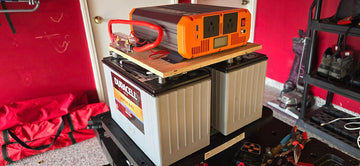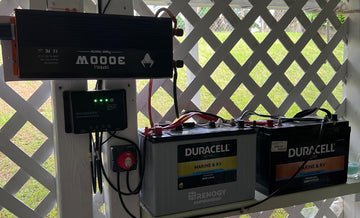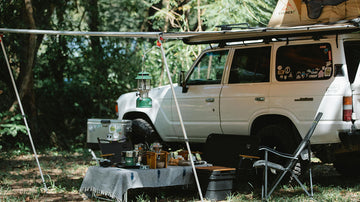24V lithium batteries are fast becoming the preferred choice for a stable, reliable, and efficient energy source, from electric vehicles to solar energy storage systems and off-grid power solutions. To ensure optimum performance and longevity of your battery system, you must charge your 24V Lithium batteries correctly and efficiently. By following the guidelines and best practices in this guide, you can maximize the potential of your battery, whether you're using a battery charger, solar panel, or generator.
Inside this Article:
- Understanding 24V lithium battery chemistry
- 24V lithium battery charging principle
- 24V lithium battery charging option
- Factors affecting the charging efficiency of 24V batteries
- 24V lithium battery charger circuit
- 24V lithium battery charger types
- Tips for correct charging and maintenance
- When charging a 24V battery, what voltage should be used?
- What is the difference between charging a 24V lithium battery and a 48V lithium battery?
- Can a 12V solar panel charge a 24V battery?
Understanding 24V lithium battery chemistry
24V lithium batteries typically use lithium ions as the charge carrier and come in a variety of chemistries, the most common being lithium cobalt-based and lithium iron phosphate ( LiFePO4 or LFP). Although they have similar characteristics, there are some important differences:
Lithium cobalt-based batteries: Commonly used in portable electronics such as laptops and mobile phones. Due to the lack of strong covalent bonds, they are prone to thermal runaway and fire.
Lithium iron phosphate batteries: It has better thermal and chemical stability, which improves safety and service life. This is the safest lithium battery available.
24V lithium battery charging principle

The charging process of a 24V Li-ion battery requires the application of an external current to the battery, which induces the migration of lithium ions between the cathode and anode. This phenomenon is observed during both charging and discharging. The electrolyte acts as an insulating barrier to prevent problems such as short circuits.
24V lithium battery charging option
There are several ways to charge a 24V lithium battery:

Dedicated lithium battery chargers: Using a charger designed for 24V lithium batteries is the most common and safest option. These chargers provide the correct voltage and current and have features such as overcharge protection, multi-cell balancing, and variable charge rates.
See more: Can I use a lead-acid charger to charge lithium batteries?
Solar charge controller: If you have the idea of installing solar panels , you can use a solar charge controller to charge a 24V lithium battery. Especially in off-grid or remote areas, solar energy can constantly provide clean and efficient energy. The role of the controller is to monitor the current generated by the solar panels, regulate the current input to the battery, and prevent short circuits or overcurrents. Solar charge controllers ensure an ideal charging process and help to extend the life of the battery.
Generator: In the absence of mains power or limited solar power, a generator can be used to charge 24V lithium batteries. However, ensure that the output voltage and current of the generator match the charging requirements of the lithium battery.
Factors affecting the charging efficiency of 24V batteries
Temperature
The efficiency of lithium batteries is affected by the ambient temperature during the charging process. Too low or too high a temperature will hurt charging efficiency and battery performance. It is recommended that 24V LiPo batteries are charged at a suitable temperature (usually between 5°C and 45°C).
Charging voltage and current
It is very important to select an appropriate charge voltage and current to balance the relationship between charge rate and battery life. It is recommended to follow the charging parameter guidelines provided by the lithium battery manufacturer to set the appropriate charging voltage and current.
Charging 24V lithium batteries with the wrong voltage and current will result in overcharging or undercharging of the battery, which will affect the capacity and performance of the battery, and seriously cause the battery to overheat or even explode.
Charge controller selection
Using the right charge controller is critical as it has a direct impact on charge efficiency, charge rate, charge safety, and battery life. For solar-powered systems in particular, the charge controller regulates the current from the solar panel to the battery, preventing overcharging and optimizing charging efficiency. Make sure you choose a controller that is compatible with 24V lithium batteries for maximum efficiency!
Charge cycle and depth of discharge
In general, the charging and discharging depths of lithium batteries are kept within the range of 20%-80% to maximize the life of the lithium battery and maintain optimum performance. Frequent over-discharging (below 20%) and over-charging (above 100%) should be avoided when using 24V lithium batteries.
24V lithium battery charger circuit

This circuit is responsible for converting AC power from the wall outlet to DC power suitable for safely and efficiently charging the battery. Below is a breakdown of the key components:
Rectifier: This component acts as a bridge between the alternating current (AC) from the mains and the direct current (DC) required by the battery. It converts AC into DC, which is critical to the charging process.
Transformer: This component reduces the voltage from the AC socket to a level suitable for charging lithium batteries. Voltage conversion is essential to ensure that the battery receives the correct amount of charge without damage. However, the need for a transformer can often be avoided by using a specially designed-charger.
Control circuit: This circuit is the brain of the charging process, monitoring the current and voltage flowing to the battery to ensure that they are within safe limits and adjusting the charging parameters according to the characteristics of the Li-ion battery to achieve optimum charging results.
Protection circuit: This circuit acts as a safety net to protect the battery and charger from overcharging, over-discharging, and short-circuiting. These safety features are essential to prevent damage to the battery and ensure its longevity.
24V lithium battery charger types

There are different types of chargers available for charging 24V lithium batteries. Here are some common 24V lithium battery chargers:
- Standard charger: simple and efficient, providing constant current and voltage output. It takes longer to charge but provides stable power
- Constant current charger: This charger charges the battery at a constant current until the battery voltage reaches the set maximum charge voltage. Constant current chargers are suitable for fast battery charging, but care must be taken to avoid overcharging.
- Constant voltage chargers: Constant voltage chargers charge the battery at a constant voltage and as the battery voltage nears the end of the charge, the charger reduces the current to avoid overcharging. This type of charger is suitable for keeping the battery charged or for maintenance charging.
- Smart chargers: Intelligent chargers with built-in microprocessors. Adjusts parameters according to battery condition to optimize performance.
- Solar charger: Converts light energy into electricity using solar energy, ideal for off-grid power. Solar chargers can also be constant current or constant voltage.
- Fast chargers: Fast chargers can charge at higher currents to reduce charging times. However, fast chargers require special design to ensure battery safety from overheating and damage.
The choice of lithium battery charger depends on your budget, actual needs, application scenarios, and most importantly, compatibility with 24V lithium batteries.
Tips for correct charging and maintenance
Here are some suggestions and tips on how to properly charge and maintain lithium batteries to improve battery life and performance:
Regular maintenance
Regular battery maintenance checks will help to maintain optimum charging efficiency. Steps you need to take:
- Checking the case for signs of damage, deformation, or fluid leakage
- Regular cleaning of battery terminals and surfaces to prevent dust and dirt build-up which can affect heat dissipation.
- Checking for loose wiring connections.
- Use a voltmeter or multimeter to regularly monitor voltage levels and identify potential problems before they escalate.
Use genuine chargers
Always use chargers and accessories recommended by the battery manufacturer and designed specifically for 24V lithium batteries. Inadequate chargers will interfere with the charging process and may damage the battery.
Correct storage
If you need to store your 24V lithium battery for an extended period, charge it to about half its capacity. Store it in a cool, dry place, away from direct sunlight and extreme temperatures.
Avoid overcharging and undercharging.
Overcharging can cause premature battery damage while undercharging can reduce battery capacity. Read and follow the manufacturer's guidelines for specific charging voltages, currents, and temperature ranges. Using the correct charging equipment can help prevent these problems.
Monitor the charging process.
Keep a close eye on the charging process to avoid leaving the battery unattended for long periods. Check the temperature and voltage of the battery regularly during charging to ensure that everything is within the recommended range.
When charging a 24V battery, what voltage should be used?
Typical 24V lithium batteries have a nominal voltage of 24V and a maximum charge voltage of about 28V. When charging a 24V LiPo battery, the voltage applied must be slightly higher than 24V, but slightly lower than the maximum charge voltage. Usually, this can be set at around 26V, which will ensure efficient charging.
If you have the budget, you can choose a charger with intelligent charge control, which can automatically adjust the charge voltage according to the state of the battery to ensure charge efficiency and battery life.
What is the difference between charging a 24V lithium battery and a 48V lithium battery?
There are significant differences between charging a 24V lithium battery and charging a 48V lithium battery. These differences can include charging voltage, charging time, and specific charger requirements. It is important to consider the specifications of the battery and the appropriate charging system to achieve the best charging results.
Charging voltage: The charging voltage for 24V LiPo batteries is different from that for 48V LiPo batteries. 24V LiPo batteries typically have a maximum charge voltage of around 28V, while 48V LiPo batteries typically have a maximum charge voltage of around 56V. The charge voltage must not exceed the maximum charge voltage for lithium batteries.
Charging time: The time required to charge a 24V lithium battery may be different from the time required to charge a 48V lithium battery.
Charger requirements: The specific charging equipment required for 24V lithium batteries may be different from that required for 48V lithium batteries.
Whether it is a 24V or 48V lithium battery, the manufacturer's charging guidelines should be strictly followed to ensure a safe and reliable charging process and to avoid damage to the battery or safety risks.
Can a 12V solar panel charge a 24V battery?
A 12V solar panel cannot be used to charge a 24V lithium battery directly. This is because the panel's output voltage is lower than the battery's operating voltage and it cannot charge effectively. The charging voltage of a 24V battery is usually 26V. If you want to use a 12V solar panel to charge a 24V battery, you may need to consider the following options:
Booster: A booster can be used to increase the output voltage of a 12V panel to 24V to suit the charging requirements of the battery.
Parallel connection: Several 12V panels can be connected to increase the output voltage. By connecting in parallel, you can increase the total output voltage to match the charging requirements of a 24V battery.
Use an adapter: Some solar charge controllers are adaptable and can accept a lower input voltage and convert it to an output voltage suitable for charging 24V batteries.
In all cases, be sure to use the correct electronics and adapters to ensure a safe and efficient charging process. It is advisable to check the specifications of the panel, battery, and charger to ensure compatibility and correct operation.

















